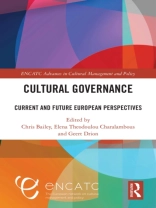Cultural governance is currently regarded as a transversal element of public policy in Europe. This book brings together academics and policy practitioners to provide new insights into the field, exploring its contemporary dynamics, dilemmas and challenges.
In light of the Cyprus Presidency in 2026, the authors reflect on the breadth and boundaries of cultural governance in a European perspective, the role of international institutions, such as UNESCO and the EU, and the frameworks and dilemmas of cultural governance as a dedicated practice. Particular attention is given to the relationship between culture and human creativity, to cultural rights and to climate breakdown, placing cultural governance at the heart of integrated public policy.
As a key contribution that enriches the field of cultural policy, this book is essential reading for academics and offers guidance for concerted action for policymakers and legislators.












